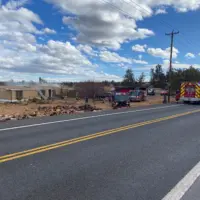
Bend Fire & Rescue responded to two reported house fires within 90 minutes of each other Wednesday. Both were linked to home heating causes, according to a news release to Bend Fire & Rescue:
At 11:00 am Bend Fire was called to a home on Evie Dr where occupants reported smoke coming from their fireplace. The fire was found to be limited to the gas insert fireplace. Wood had been added to the gas fireplace insert and turned on. The wood ignited and, as the fireplace was not designed for this type of fire, started to smoke inside the house and through exterior vent. The fire was extinguished with minimal damage to the house and contents, but the insert will need to be replaced. All 3 occupants evacuated safely, and damage was limited to the insert, about $2500.
This is a good reminder to always use heating appliances as designed. Whether it’s a gas fireplace insert, a space heater, or outdoor propane heater, always follow the manufacturers guidelines on safe operation. A common issue we see this time of year is when outdoor heaters are brought into unventilated spaces such as garages, shops, or enclosed tents. The outdoor heaters produce a large quantity of carbon monoxide. If the heaters are not ventilated the CO can build up and create a hazardous atmosphere.
The second fire was reported at 12:20 by the property owner on Deschutes Market Rd. The owner was on site and had lit a fire in a woodstove inside an unused manufactured home. Shortly after the fire started, smoke was seen coming from the roof and he called 911. Crews arrived quickly and began fighting the fire. The high winds today spread the fire in the concealed roof space as crews attempted to extinguish it. The fire was eventually stopped but the 1978 manufactured home is considered a complete loss ($10,000).
In this case the woodstove had not been used for many years and it’s unknown the condition of the flue or attic space before the fire was started. Having your woodstove inspected and cleaned annually by a qualified professional can greatly lessen the chance of these types of fires. They can ensure the flue is still properly connected, that no combustibles have made contact with the flue in the past year, and that the flue is thoroughly cleaned from any creosote buildup. Burning clean dry firewood will ensure a good clean fire and reduce the creosote buildup over the winter.















